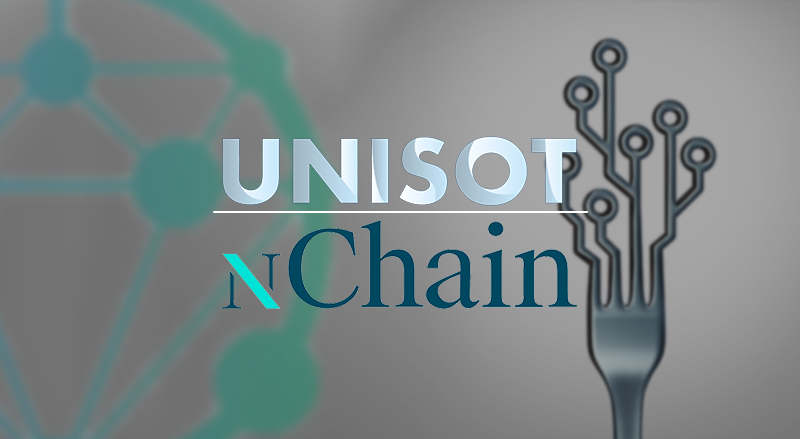- Consumers are increasingly conscious about where their food comes from and want to buy sustainably and ethically.
- Food fraud is a growing issue, with the ‘food fraud economy’ currently impacting over 10% of the global supply chain and costing the industry $40 billion annually.
- UNISOT offers a plug-in solution to SAP, Microsoft, and Oracle that enables companies to connect to a global data layer – the Universal Source of Truth (UNISOT).
- UNISOT creates smart digital twins and a digital product passport that can be scanned by end consumers to obtain information on the product’s sustainability, ingredients, and origin.
- UNISOT’s solution is powered by nChain blockchain technology, which enables the company to roll out the application globally due to its scalability, integrity, availability, efficiency, and stability.
- The UNISOT platform enables manufacturers to fulfil legal and ethical requirements and comply with regulations that promote transparency, such as the EC Corporate Sustainability Due Diligence (CSDD) rules and the Digital Product Passport (DPP).
- Traceability is essential to track products from source to the point of sale with information on origin, storage conditions, and product quality, and the decentralised nature of blockchain technology can enable global interoperability.
Consumers around the world are increasingly conscious about where exactly their food comes from and how it is sourced. This has grown out of a desire to eat more healthily and mindfully, with people also recognising the need to buy sustainably and ethically.
This desire has further accelerated in recent years due to several food safety incidents such as the Nestle E. coli outbreak in France, which saw the company shut down an entire plant after more than 56 people were confirmed sick. More recently, a criminal investigation was announced into allegations that a rogue meat supplier falsely labelled huge quantities of foreign pork as British.
From wood chips parading as parmesan cheese to tilapia disguised as sea bass, US citizens have spent the last decade unwittingly paying top dollar for questionable practices from trusted brands such as Burger King, Kraft Heinz, and Subway, to name a few. It is estimated that this ‘food fraud economy’ currently impacts over 10% of the global supply chain and costs the industry $40 billion annually, according to The Consumer Brands Association.
UNISOT bites back against food fraud
To address these and other issues, UNISOT (a Web3 supply chain traceability platform as a service) offers a plug-in solution to SAP, Microsoft, and Oracle that enables companies to connect to a global data layer – the Universal Source of Truth (UNISOT). This integration simplifies the process for all companies by allowing them to connect through a single integration.
It also enables companies to become an oracle in blockchain and create smart contracts and automatic scripting. To achieve this, the company creates smart digital twins, which enable every actor in the supply chain to manage a product and add information to it.
The technology also provides a digital product passport that can be scanned by end consumers to obtain information on the product’s sustainability, ingredients, and origin.
Tracking and tracing using digital passports
Companies like UNISOT are creating track and trace solutions using blockchain technology to introduce transparency and traceability into every stage of the supply chain. This is achieved through the implementation of Digital Product Passports (DPP).
The DPP consolidates information from various parties involved in the supply chain, such as raw material sources, manufacturing facilities, certifications, and waste management practices. By scanning a QR code, manufacturers and end users can access this information, including details on cold chain integrity and carbon footprint.
The DPP empowers consumers to make informed purchase decisions and provides suppliers with a means to demonstrate accountability.
UNISOT’s solution is powered by nChain blockchain technology, which not only makes this a reality, but enables UNISOT to expediently roll out the application globally, due to its unique characteristics: scalability, integrity, availability, efficiency, and, most importantly, stability.
‘We felt the time was right to offer a blockchain solution to the food industry to help them verify products entering the consumer market,’ said Stephan Nilsson, Co-Founder of UNISOT.
‘Food suppliers need to demonstrate transparency across the global supply chain, via a standardised system to track and authenticate products. Manufacturers and consumers have been demanding this for years, with the DPP facilitating the ability to simply scan a label and view data via the application.’
UNISOT meets all regulatory requirements
The UNISOT platform enables manufacturers to fulfil legal and ethical requirements – compliance with EC Corporate Sustainability Due Diligence (CSDD) rules, the Digital Product Passport (DPP), and the EC Ecodesign for Sustainable Products Regulation (ESPR), proposed and obligated by the European Commission to promote transparency.
According to the EC, these regulations will impact the majority of European food businesses, as customers demand more sustainable and informed choices in the coming years.
Food integrity has been a growing issue for policymakers, food systems, and consumers for many years. Traceability is essential to track products from source to the point of sale with the information incorporated from multiple sources about the origin, storage conditions, and product quality.
The decentralised nature of blockchain technology can enable the global interoperability that supply chain traceability requires to create widespread and much-needed change across the industry.
